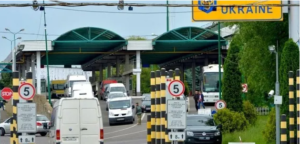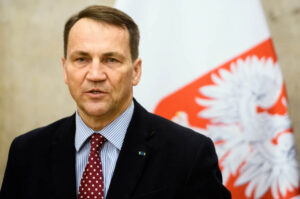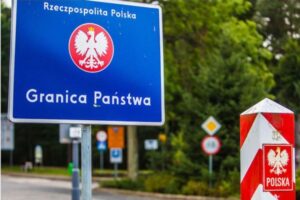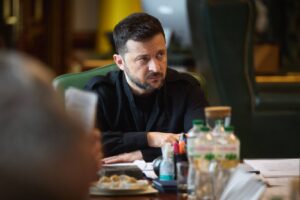
On Saturday at 12:50 p.m., Polish protesters blocked traffic in front of the Medyka border crossing point (opposite the Ukrainian Shehyni border crossing point), according to the State Border Service of Ukraine.
“The restrictions apply only to trucks and may last at least six hours. Traffic for passenger cars and buses remains unchanged,” border guards said on their Telegram channel on Saturday.
“There are 681 trucks registered in the queue to leave Ukraine, and about 100 are waiting to enter, which are already in a specially equipped parking lot, and nothing will interfere with their clearance,” the message said.
The protesters’ rally is taking place one kilometer from the Polish border crossing.
The State Border Service will provide additional information about any changes or complications in traffic.

The Polish Ministry of Foreign Affairs has called on the country’s citizens to leave Belarus as soon as possible and refrain from any travel there. The ministry recommends that those already in Belarus leave “by available commercial or private means,” warning that if the situation worsens, evacuation may be difficult or impossible. This was announced at a briefing on September 5 by Polish Foreign Ministry spokesman Paweł Wroński; the relevant statements were reported by the Polish media.
According to Wronski, the Foreign Ministry “strongly discourages” travel to Belarus, “which is not a democratic country and is not friendly to the Republic of Poland,” and asks that the warning be taken very seriously. Polish media outlets indicate that citizens in Belarus are advised to leave immediately.
As noted by a number of publications, the heightened warning is related to the detention in Belarus of a Polish citizen, a Catholic monk whom Minsk accuses of espionage; the Polish side called this a “provocation” and announced consular support for the detainee. Against this backdrop, the Foreign Ministry issued a separate warning about the risks and reminded citizens of the need to strictly comply with local laws.
Earlier, Polish media outlets had already drawn attention to the restrictions and risks for Poles in Belarus, including the Foreign Ministry’s recommendation to leave the country by any means available and a warning that evacuation may not be possible in the event of a crisis.

Poland has deported 15 Ukrainian citizens who “posed a threat to public safety and order in Poland” and handed them over to the Ukrainian side, Polish broadcaster RMF24 reported.
“15 Ukrainian citizens were deported from Poland. They were forcibly brought to the border by border guards and handed over to the Ukrainian side,” the broadcaster said in a statement on its website on Saturday.
Polish border guards claim that the 15 Ukrainians who were expelled from the country had been repeatedly convicted of theft, robbery, and drunk driving. According to them, they “posed a threat to public safety and order in Poland.” In one case, a Ukrainian was on the list of persons whose stay in Poland is considered undesirable.
The people covered by this procedure had been repeatedly convicted of crimes and offenses. These included theft, robbery, possession of narcotic and psychotropic substances, document forgery, drunk driving, and organizing illegal crossings of the Polish border. In addition to being expelled from the country, they were also banned from entering Poland for 5-10 years.
“Poland is a friendly country, open to foreigners. However, there has been and will be no tolerance for violations of the law by them, regardless of their country of origin. The Ministry of Internal Affairs and Administration will respond decisively to violations of our legal order,” said ministry spokeswoman Karolina Halecka, as quoted by the publication.
It is noted that since the beginning of the year, 1,100 foreigners have been forced to leave Poland.
As reported, Polish Prime Minister Donald Tusk announced in early August that after riots at a concert by Belarusian rapper Max Korzh at the National Stadium in Warsaw, 57 Ukrainians would have to leave the country.

The number of Ukrainians under temporary protection in Poland increased by 5,600 in June 2025 to 992,500, which is the largest monthly increase among all EU countries (+0.6% per month), according to the analytical center of the international employment company Gremi Personal.
“Over the year, the number of Ukrainians per thousand Poles has increased from 26 to 27. These data indicate that Poland remains attractive to Ukrainians as a place of temporary or even long-term residence. In addition, the European Council’s decision to extend temporary protection until March 4, 2027, gives Ukrainians in Poland more confidence in the future, as well as the opportunity to plan their education, work, or integration into local communities,” said Yuriy Grygorenko, director of the Gremi Personal analytical center.
It is noted that the growth rate of the Ukrainian community has slowed down, but Poland remains in second place in the EU in terms of the number of Ukrainians with this status after Germany (about 1.2 million people) and remains home to 23% of all Ukrainians who have received temporary protection in Europe. In total, according to Eurostat, as of June 30, more than 4.3 million Ukrainian citizens were under temporary protection in the EU.
The center’s analysts also note a decrease in the share of women in the structure of Ukrainian refugees in EU countries from 45.6% to 44.7%, while the share of men, on the contrary, increased from 22.0% to 24.1%.
“The increase in the proportion of men in EU countries may be related to the fact that after the first years of the war, Ukrainian men who were eligible to leave (large families, people with disabilities, elderly men) are more likely to join their families in the EU. In addition, while the first waves of departure were mainly forced and protective in nature (women with children fleeing danger), now more Ukrainians are leaving for economic reasons—to find work or stable living conditions,” Hryhorenko noted.
He also drew attention to the fact that children still account for a high proportion of temporary refugees (over 31%), which in the long term could create risks of some families not returning to Ukraine after the war. “The prolonged presence of a significant number of women and children abroad creates risks of depopulation and the loss of a generation. A gradual increase in the proportion of men may indicate that families are settling in the EU and that their chances of returning to Ukraine after the war are potentially decreasing,” Hryhorenko concluded.
Source: https://interfax.com.ua/

Polish Defense Minister Vladislav Kosiniak-Kamysz said that the country intends to create an army of more than 500,000 troops.
This significantly exceeds the plans previously announced by President Karol Navrocki to bring the army to 300,000.
“We will create an army larger than the one President Nawrocki spoke about — not 300,000, but more than 500,000 people,” the minister said in an interview with Rzeczpospolita.
According to him, the president has already approved plans to expand the army.
Currently, there are more than 210,000 soldiers in the Polish army, and by the end of 2025, this figure is expected to reach 230,000.
Earlier, Prime Minister Donald Tusk said that the Polish army is already the largest in the EU and in a few years will become “the strongest in the region.”

Ukrainian President Volodymyr Zelensky has signed a law recognizing Ukrainian citizens who were forcibly resettled from the territory of the Polish People’s Republic in 1944-1951 as deportees. The relevant law card No. 4540-IX with the signature of the President of Ukraine has been published on the website of the Verkhovna Rada.
Ukrainian Foreign Minister Andriy Sibiga noted that this law restores historical justice regarding this “horrible crime.”
“President of Ukraine Volodymyr Zelenskyy has just signed an important law restoring the memory of Ukrainians forcibly deported from Poland in 1944-1951. This is a correct and dignified step that restores historical justice regarding this horrific crime. I thank the president for supporting this decision, as well as the members of parliament who developed and implemented it,” he wrote on his Facebook page.
The minister noted that “many witnesses of those tragic events have already passed away,” but in order to protect the rights of “those who still live with us and their descendants,” Ukraine guarantees the provision of assistance as provided by law.